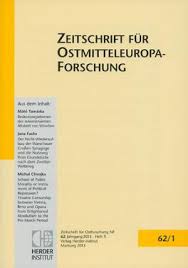Personaleinsatz und -mobilität in der litauischen Provinz der Gesellschaft Jesu im 18. Jahrhundert
Deployment and Mobility of Personnel in the Lithuanian Province of the Society of Jesus in the 18th Century
Author(s): Andrea MarianiSubject(s): Christian Theology and Religion, Local History / Microhistory, Social history, 18th Century
Published by: Verlag Herder-Institut
Keywords: Deployment; Mobility of Personnel; Lithuanian Province; Society of Jesus; 18th Century;
Summary/Abstract: The career of the Jesuits of the Lithuanian province during the 18th century is an issue that has been totally disregarded by Polish as well as Lithuanian historians who have predominantly investigated the cultural aspects of the activity of the Jesuit order. Therefore, it is necessary to apply a new social-historical approach to the study, based on sources preserved in the Roman Archive of the Society of Jesus as well as on the private documents of former aristocratic families of the Great Duchy of Lithuania. Personnel catalogues play a crucial role among the first group of sources. The preservation of whole files enables data evaluation through instruments of statistical analysis. First of all, the author presents the origins of the Lithuanian province of the Society of Jesus against the background of Jesuit adaptation to the political and social conditions of the Polish-Lithuanian Commonwealth. Then the geographical location of the most important colleges of the Lithuanian province is outlined. Even if Vilnius remained dominant as the administrative centre of the Order in the Great Duchy of Lithuania, the territories of the current Belarus were increasingly penetrated by Jesuit missionaries in the 18th century. The following section presents the changes in the composition of the Jesuit personnel, concentrating in particular on the ratio of religious and secular members of the Order. Knowledge of languages spoken by the ethnic groups living in the Polish-Lithuanian Commonwealth as well as geographical and social origins of the Jesuit priests deeply influenced the pastoral activity of preachers and missionaries. The analysis of the mentioned features shows how Jesuits passed from one office to another within the same college. This internal mobility was linked to geographical mobility, which manifested itself through recurrent relocation. In the conclusion, the author states that the career of the religious people depended above all on their skills rather than their origins. Personal talents were necessary to submit superior vows, which gave Jesuits the opportunity to achieve higher posts in the Order’s administration. However, if we consider the personal contacts between Jesuits and aristocrats, it turns out that the career of certain priests was favored by the protection of important political personalities. This was also profitable for the Order as a whole: by choosing as rector a Jesuit who was on good terms with the founder of the college, the superiors of the Order ensured the monastery the further support of the local elite.
Journal: Zeitschrift für Ostmitteleuropa-Forschung
- Issue Year: 63/2014
- Issue No: 2
- Page Range: 163-213
- Page Count: 51
- Language: German

